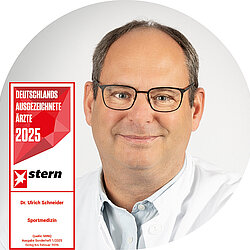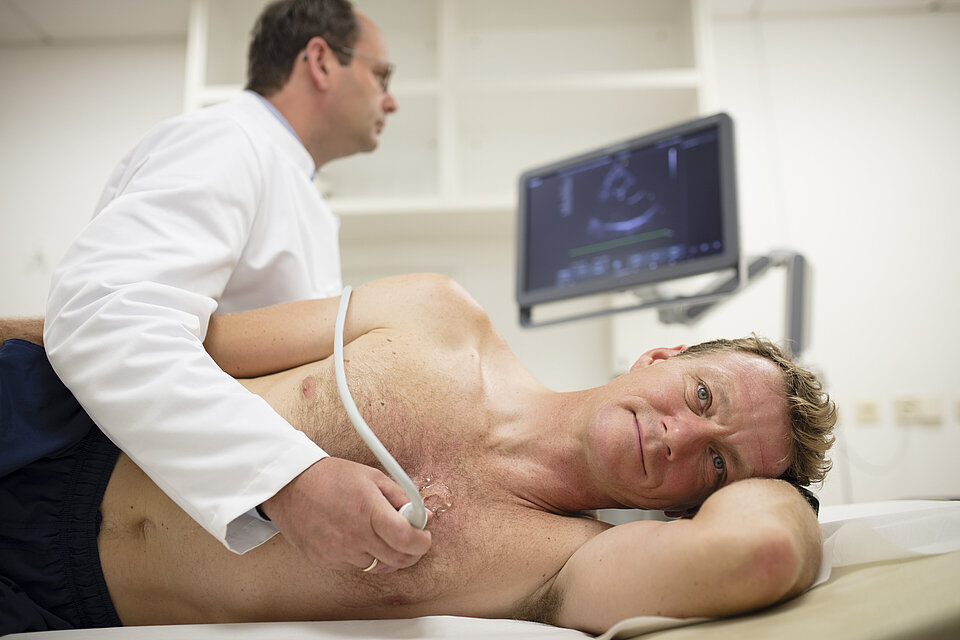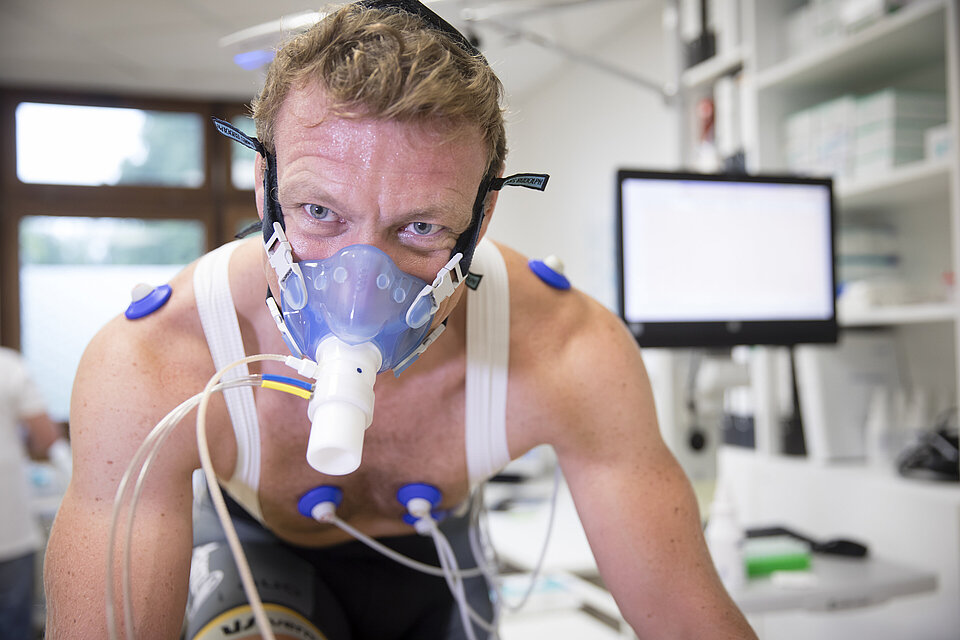Our doctors and sports scientists examine your health and endurance performance, check your posture and measure your strength in order to identify any deficits and, if necessary, jointly draw up a training plan based on your personal goals and current ability. Our sports medicine team is the point of contact for athletes who want to optimize their performance as well as for newcomers to sport or those returning to sport who want to start training well prepared and without risk. The Sports Medicine department is also the right place for patients with illnesses and sports medicine issues.
Prevention plays a major role in sport. Medical check-ups can prevent serious complications in sport and at the same time highlight and thus avoid overuse. In the Sports Medicine Department at Sportklinik Hellersen, we carry out examinations for fitness for sport in accordance with the DGSP/ACSM guidelines and offer sports medicine consultations for health-oriented sport. We are also an examination center for DOSB and LSB squad athletes.
An important focus of our sports medicine services is performance diagnostics. Under medical supervision, physical fitness is assessed and individual performance is evaluated. The key questions are: Is the athlete/patient healthy and in what form is exercise recommended for them?
Performance diagnostics are therefore always preceded by a medical check. This allows abnormalities to be ruled out, under which conditions the test would not be possible. This initial check includes a medical history interview with a sports physician, a resting ECG and a resting blood pressure measurement.
An important focus of our sports medicine services is performance diagnostics. Under medical supervision, physical fitness is assessed and individual performance is evaluated. The key questions are: Is the athlete/patient healthy and in what form is sporting exertion recommended for them?
Performance diagnostics are therefore always preceded by a medical check. This allows any abnormalities to be ruled out, under which conditions the test would not be possible. This initial check includes a medical history interview with a sports physician, a resting ECG and a resting blood pressure measurement.
Preparation for the performance diagnostics:
Anyone undergoing performance diagnostics should arrive at the sports medicine clinic feeling refreshed and healthy. This also means not training intensively or taking part in competitions in the days before the test. The diet should be carbohydrate-heavy in the run-up to the test, but there should be two hours between the last meal and the test.
This is followed by the actual performance diagnostics. This is possible either on a treadmill, bicycle, rowing machine or on a hand-crank ergometer. During the test, an exercise ECG is performed and the heart rate is determined using a chest strap. In addition, a respiratory gas analysis can be carried out and the lactate concentration can be determined using blood samples taken from the ear in order to determine the level of exertion. The evaluation of the results is part of the debriefing. During the discussion with the sports scientist, it is discussed where individual strengths and weaknesses lie, for example, how improvements can be made and what should be avoided during training.
In some cases, the costs of performance diagnostics can be covered by health insurance companies. We therefore recommend that you contact your health insurance provider in advance to obtain information on the exact conditions and possibilities of reimbursement for the performance diagnostics carried out.
In order to obtain reliable data from your performance diagnostics test, you should pay attention to the following aspects in the days leading up to your performance test:
Arrive healthy and rested for your performance diagnostics test
- No intensive or extensive training in the last 3 days before the test
- The last competition should have been at least 7 days ago
- No low-carbohydrate diet in the days before the test
- No carbohydrate-rich drinks immediately before the test
- Last meal and carbohydrate intake at least 2 hours before the test
Please bring this with you
- Sportswear and towel
- Utensils for showering
- Clean running or cycling shoes
For cyclists: Shimano-SPD pedals (MTB) are available. For other systems, please bring your pedals as well as your shoes. Cyclists can also bring their racing bike or mountain bike (can only be mounted using a quick release and not with a thru axle) and complete their test on the Cyclus2 ergometer.
If performance diagnostics have already been carried out at another institute, documents from the test will help to assess individual performance development. Training records and/or previous medical findings can also be helpful.
For cyclists: Shimano-SPD pedals (MTB) are available. For other systems, please bring your pedals as well as your shoes. Cyclists can also bring their racing bike or mountain bike (can only be mounted using a quick release and not with a thru axle) and complete their test on the Cyclus2 ergometer.
If performance diagnostics have already been carried out at another institute, documents from the test will help to assess individual performance development. Training records and/or previous medical findings can also be helpful.
Strength diagnostics (back check)
The Back-Check is used as a test system for strength diagnostics. It is used to determine the muscular status of the trunk muscles. At the same time, sports medicine uses the test system to identify and quantify muscular imbalances. The test checks the performance of the posture-stabilizing muscles and enables recommendations to be made for health-oriented and targeted training of the trunk muscles.
Squad tests / fitness for sport
Since 1998, the Sports Medicine Department at Sportklinik Hellersen has had the status of a DOSB- and LSB-NRW-accredited examination center. This goes hand in hand with the task of examining athletes in the national and NRW state squads for health, performance and fitness for sport. The DFB has also commissioned Hellersen Sports Medicine to examine Bundesliga referees since 1998. Regular health checks are particularly important in competitive sport and are often a prerequisite for being allowed to take part in competitions.
Training planning
Training is always planned individually and is based on the athlete's respective goals - whether they are a competitive, amateur or ambitious hobby athlete. This can be, for example, increasing endurance performance or structural preparation for competitions. The fundamental aim of training planning is to avoid overstraining and overuse injuries and to only challenge the body to a healthy extent. Training planning therefore also includes regular medical checks to ensure optimal and appropriate training, as well as training documentation. Targeted rest breaks should also always be taken into account so that the body can adapt.
Bioimpedance analysis
Bioimpedance analysis is used to measure body composition and derive energy expenditure. The analysis calculates the muscle, fat and water content of the body as well as the daily calorie consumption at rest. The calculation not only relates to the entire body, but also provides information on the distribution of the arms, legs and torso. The sports scientists at Sportklinik Hellersen also use bioimpedance analysis to assess performance development, especially in sports where body weight is a performance-limiting factor.
Suitability for diving
The diving fitness examination determines whether the person is fit to dive and can practice diving safely. Our Specialist Physician carries out the examinations in accordance with the guidelines of the GTÜM (Society for Diving and Hyperbaric Medicine). Among other things, the examination records the general physical condition, resting blood pressure, heart rate and blood pressure under pressure. During a pulmonary function test, the doctor determines the vital parameters of the lungs (lung volume, vital capacity, etc.).

Elena Krenz
Sports medicine office
- Phone+49 2351 945-2281
- Fax+49 2351 945-2283
- sekretariat.schneider@hellersen.de





